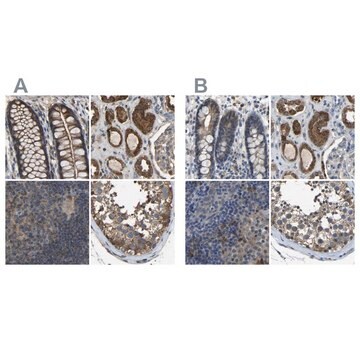RAB0537
Human FABP2 / Fatty Acid-Binding Protein, Intestinal ELISA Kit
for serum, plasma, cell culture supernatants and urine
Synonym(s):
FABP2 ELISA Kit, Intestinal FABP2 Detection
About This Item
Recommended Products
species reactivity
human
packaging
kit of 96 wells (12 strips x 8 wells)
technique(s)
ELISA: suitable
input
sample type plasma
sample type serum
sample type urine
sample type cell culture supernatant(s)
assay range
inter-assay cv: <10%
intra-assay cv: <12%
sensitivity: 25 pg/mL
detection method
colorimetric
shipped in
wet ice
storage temp.
−20°C
Gene Information
human ... FABP2(2169)
General description
Fatty acid-binding protein (FABP2) is an intracellular protein, encoded by the gene mapped to human chromosome 4q28–q31.It is expressed in intestinal enterocytes. FABP2 codes for intestinal FABP (I-FABP).
Application
Please refer to the attached General ELISA KIT Procedure (sandwich, competitive & Indirect ELISA)
Biochem/physiol Actions
Other Notes
Please type the word sample in the text box provided for lot number.
Kit Components Also Available Separately
Signal Word
Warning
Hazard Statements
Precautionary Statements
Hazard Classifications
Met. Corr. 1
Storage Class Code
8A - Combustible corrosive hazardous materials
Flash Point(F)
Not applicable
Flash Point(C)
Not applicable
Certificates of Analysis (COA)
Search for Certificates of Analysis (COA) by entering the products Lot/Batch Number. Lot and Batch Numbers can be found on a product’s label following the words ‘Lot’ or ‘Batch’.
Already Own This Product?
Find documentation for the products that you have recently purchased in the Document Library.
Our team of scientists has experience in all areas of research including Life Science, Material Science, Chemical Synthesis, Chromatography, Analytical and many others.
Contact Technical Service







